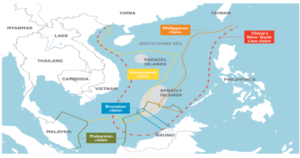Reading this article along with the previous two on the same subject provide a more comprehensive picture.
Solving the Disputes
Considering the complicated nature of the SCS dispute, finding a solution is easier said than done.
Even the leaders from the claimant states and subject experts have differing opinions about its resolution. Some of these opinions are as follows:
- Manage the dispute and keep the claimants engaged in negotiations. Keep on talking and engaging each other at different levels through bilateral and multilateral forums.
- Follow the law of the sea and honour the International laws. Take legal recourse or a third party intervention.
- Follow collective effort through ASEAN to manage the dispute and to prevent major conflicts.
- Show restraint in order not to provoke one another, either through statements or actions, stop reclamation activities and militarization of the features in the SCS.
- Maintain the status quo and wait for a good time to deal with the issue.
- Cooperate on the non-contentious soft areas in order to build confidence and trust, such as marine environment protection, search and rescue, safety of navigation, and combating transnational crimes. Later on, other contentious issues could be dealt with.
- Resort to joint explorations and sharing of resources like oil and gas.
Suggested Approach
The answer lies in the claimants abandoning their confrontational attitude and agreeing to find some common ground, even at the cost of sacrificing certain portions of their claims.
One possible approach to the peaceful solution could be for all claimants to limit their claim to the areas of 200 nautical miles of the EEZ and continental shelf in accordance with the UNCLOS, leaving international waters for free navigation and overt flight.
Another approach could be the parties concerned to establish a common ownership of the disputed areas, whereby all the revenues from the SCS are equitably or proportionately shared among the littoral states.
In SCS dispute, China is the key player and future of the dispute depends on the China’s attitude and actions in future.
India and the SCS
India is a vital player and has interests in the SCS as a major portion of its trade passes through the region. India’s interests also include the energy contracts that its public sector giant Oil and Natural Gas Commission’s Videshi Limited (OVL) had acquired through legal and global norms in the South China Sea.
India has, on several occasions, called upon all parties to avoid unilateral action that leads to tensions in the region and called for peaceful resolution of disputes without the threat of use of force.
India must continue to actively pursue its defense diplomacy outreach in the Indo-Pacific region including military training and exercises and exchanges, extend Humanitarian Assistance & Disaster Relief activities and share patrolling of the Malacca Strait with the littoral countries, etc.
Comments and value additions are most welcome
For regular updates please register here –
https://55nda.com/blogs/anil-khosla/subscribe/
References:
- https://scroll.in/article/968918/how-did-the-south-china-sea-dispute-begin-and-where-is-it-headed
- https://www.bbc.com/news/world-us-canada-53397673
- https://www.lowyinstitute.org/issues/south-china-sea
- https://www.peacepalacelibrary.nl/library-special/south-china-sea-territorial-disputes/
- https://www.drishtiias.com/daily-updates/daily-news-analysis/south-china-sea-dispute
- https://www.straight.com/news/khalid-zaka-a-summary-of-south-china-sea-conflict
-
The Politics of South China Sea Disputes, book by Nehginpao Kipgen


Area of action for coming decades. Well covered bullets
Thanks sir.
There is so much to it.
this is just a glimpse.
Action for resolution of disputes well covered, china can not be allowed to treat scs as it’s maritime empire.
But it all depends on China
Not easy to tackle China…..except through show of strength which must be more than Chinese.
China believes in
जिसकी लाठी उसकी भैंसे